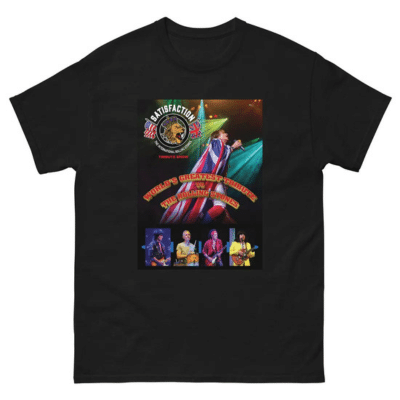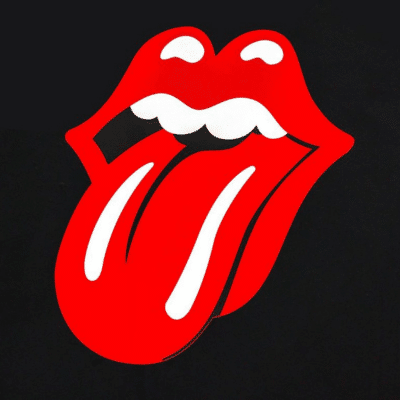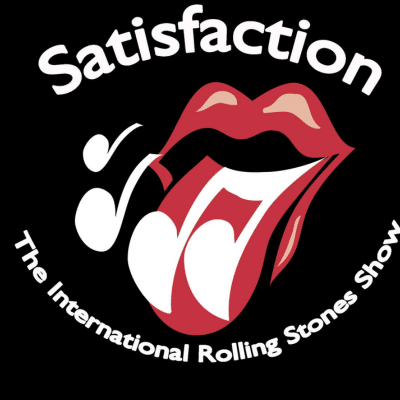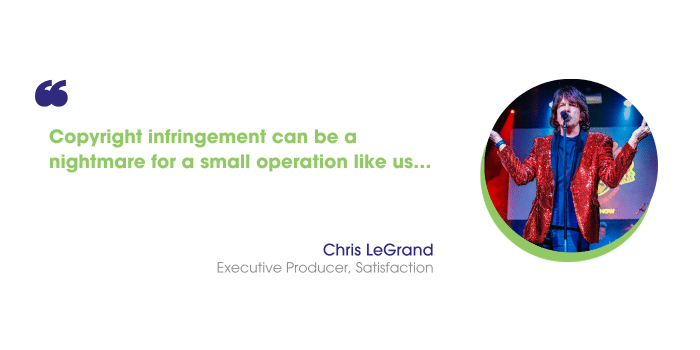Satisfaction/The International Rolling Stones Tribute Show has been rocking around the world for nearly a quarter century.
Like a pack of wild horses, the tribute band hits the road for up to 150 performances a year. Although most of the group’s revenue comes from touring, as it does for nearly all musical acts after the internet decimated record sales, branded merchandise accounts for 10%-20% of Satisfaction’s annual income, according to executive producer Chris LeGrand.
“We’re impersonating and replicating one of the most iconic bands of all time, who are very aggressive in their marketing, so we don’t want to put out a simple black and white T-shirt,” LeGrand says. “Our brand relies on a lot of colors. We feel it makes a statement.”

However, when designing merch, tribute bands must be very careful not to infringe upon the original artist’s intellectual property. Even if the imagery isn’t a facsimile, anything that’s deceptively similar can be grounds for a legal challenge by the trademark owner.
- The Lanham Act provides for a national system of trademark registration and protects the owner of a federally registered trademark against the use of similar marks if such use is likely to result in consumer confusion or if the dilution of a trademark is likely to occur.
In the case of Satisfaction’s first logo, the band learned that you can’t always get what you want.
Under Their Thumb
LeGrand says the band sent The Rolling Stones’ tongue and lips logo – one of the most recognizable images in all of pop culture – to a graphic artist and said, “We want to take the basics of this, but we want to create our own.”
The graphic artist produced an ersatz logo, simply adding some musical notes and Satisfaction’s name to the iconic mouth, which drew the ire of The Rolling Stones when the tribute band needed permission to perform certain gigs.
“The first thing that came back was that Mick Jagger didn’t care for that logo,” LeGrand says. “He wanted it changed. It came from the man himself, so we had to come up with a redesign.”


Satisfaction revised its promotional materials and merch to showcase a photo of the band along with a new logo featuring a Barbary lion (one of England’s national symbols) wearing a crown and sandwiched between the American flag and the Union Jack. The group has emblazoned that design on T-shirts, drinkware, a coaster, a flag and a tote bag, all of which are available on the band’s online store powered by Shopify.
- For concert merch, the band most recently ordered from Texas-based provider Bandwear and relies upon California-based Printful for made-to-order e-commerce purchases.
In addition to changing its logo, Satisfaction was instructed to include the word “tribute” in all marketing materials and put a disclaimer on its website that says it’s not endorsed by or affiliated with The Rolling Stones, LeGrand says. Aside from receiving a cease-and-desist letter because other entities had adopted the ditched logo from the internet, LeGrand says that the band hasn’t heard from The Rolling Stones since complying with the exigencies.

“You don’t want to go down that road to where you import anything that they’ve used,” LeGrand says. “You don’t want that kind of attention. Copyright infringement can be a nightmare for a small operation like us when you’re dealing with The Rolling Stones, Coca-Cola or whoever it might be.”
Beast Of Burden
Protecting intellectual property (IP) is a major concern for the promotional products industry, which is fueled by creativity and innovation.
- Trademarks, copyrights and patents are designed to distinguish one’s products or services from another’s.
- Those protections enable customers to know what they can expect, ultimately building brand loyalty.
Although the need to protect IP isn’t called into play until someone infringes on it, suppliers, distributors, decorators and business service providers should keep an eye on the market to remain vigilant. For example, suppliers are urged to file a patent application before public disclosure.
“If you wait to file, you may waive your rights or limit the remedies,” said Justin Miller, Esq., a patent attorney with Larson & Larson, at the 2019 PPAI Product Responsibility Summit.
- In a landmark legal victory for the promo industry in 2018, a federal court jury ruled in favor of ETS Express after the supplier was sued for alleged trademark infringement by Can’t Live Without It, LLC, dba S’well Bottle.
Conversely, you don’t want to infringe upon someone else’s IP when creating or designing products. When accepting an order, distributors should avoid the obvious such as Disney, Star Wars, Marvel characters and the like, as well as famous landmarks, slogans, logos, likenesses of famous people and photos and art of unknown origin.
RELATED: New Ruling Could Make Design Patents Harder To Obtain
“Fair use laws remain extremely gray, and companies incorporating copyrighted assets into their work should be aware that the case-by-case and context-sensitive evaluation lends itself to much subjective speculation about how a court of law, i.e., a judge or a panel of judges, may apply an objective analysis in determining whether a use of a copyrighted work is fair and thus non-infringing,” wrote Cory Halliburton, an attorney with Freeman Law and general counsel for PPAI, in a commentary last year on the Copyright Act’s ‘fair use’ doctrine.
No Sympathy For The Blue Devil
Danny Rosin, CAS, president and co-owner of North Carolina-based distributor Brand Fuel – the No. 46 distributor in the 2024 PPAI 100 – knows all too well about the perils of trademark infringement.
To cover the costs of attending the University of North Carolina, Rosin sold bootleg UNC-themed T-shirts during his college years. Eventually, after bashing archrival Duke University one too many times, he got busted by the Collegiate Licensing Company and his “Top 10 Reasons not to go to The University of New Jersey at Durham (Duke)” shirts were confiscated.
“The younger Danny that sold ‘Duke Sucks’ T-shirts when he was at UNC, who ran from the cops after hocking shirts at concerts and basketball games, would say that it’s every man for himself,” says Rosin, a member of the PPAI Board. “But the current Danny says that licensing is important. Elton John, as rich as he is, has earned the right to manage his brand the way he wants/needs to.”
An avid music lover who co-founded Band Together NC, a volunteer-driven nonprofit whose mission is to use live music as a platform for social change, Rosin says there are two trains of thought when it comes to brand management in the music industry:
- The Grateful Dead’s “open-source” strategy of allowing concertgoers to record and distribute their shows for free, resulting in the band quadrupling its fan base and becoming one of the most successful touring acts from 1985 to 1995.
- Musical artists who are highly litigious regarding their intellectual property to protect their brand.
“To have a cover band try to sell something that’s not in the style guidelines of the brand is a fail,” Rosin says. “It confuses and dilutes the marketplace. If you really want to protect the brand, you have to take action. You want to make sure your brand isn’t put on something that’s made in Bangladesh by a 6-year-old kid in a horrible working environment. You don’t want your logo on an ashtray or a doormat, unless it’s printed like a concert ticket stub, which exists.”

Truly changing his tune from his hustling college days, Rosin suggests that tribute bands go so far as to pay a royalty to the original artist’s record label. After all, the tribute band’s entire business model is based off capitalizing on the creations of another artist.
“It’s almost easier to sell merch if you have that jumping off point from the foundation of the band that originally created the music, so pay that band a little bit to say thank you and to make sure the brand is controlled properly,” Rosin says. “At Chapel Hill, I sold a lot of UNC stuff and never paid them a penny because I was paying my way through school selling merch. Now that I’m older, I realize that I was making money off the university’s marks, long tradition, Carolina Blue, etc.
“Maybe UNC should’ve received a little percentage with those royalties going to scholarships for people like me who couldn’t afford to go to college.”
(Don’t Just) Paint It, Black
Despite the legal restraints, tribute bands are only limited by their distributor’s imagination when it comes to designing merch, according to Jeremy Picker, CEO and creative director of Denver-based distributor AMB3R and a 2024 #Online18 honoree.
“It comes down to the creativity of the merch company,” says Picker, who managed merch for wildly popular Christian rock bands, such as Switchfoot and Relient K, before converting to promo.
“If you’re just taking in-house designs and going to a screen printer to print it, okay, but where’s the cohesiveness? Are you researching what bands were selling in the ‘70s, ‘80s and ‘90s and replicating that era? You have to figure out how to bring that nostalgia with your merch.”

Picker is currently creating rock and roll-style merch for some local sushi restaurants. He says the shirts pastiche old band tees: soft, worn in and with pigment-dyed garment. “It fits the vibe and culture of the restaurant,” Picker says. “There’s no reason why these cover bands can’t do the same.”
“The vintage band T-shirt inspiration is everywhere from Urban Outfitters to Target,” he adds. “Obviously, they’re licensed to use the bands’ names, but you can still do so much to make your merch look like their shirts. Crackle ink is a great example of how one little ink additive can make a new shirt look like you got it at a vintage store. It’s just finding the designer that understands the sourcing and how to make the merchandise reflective of that era.”


